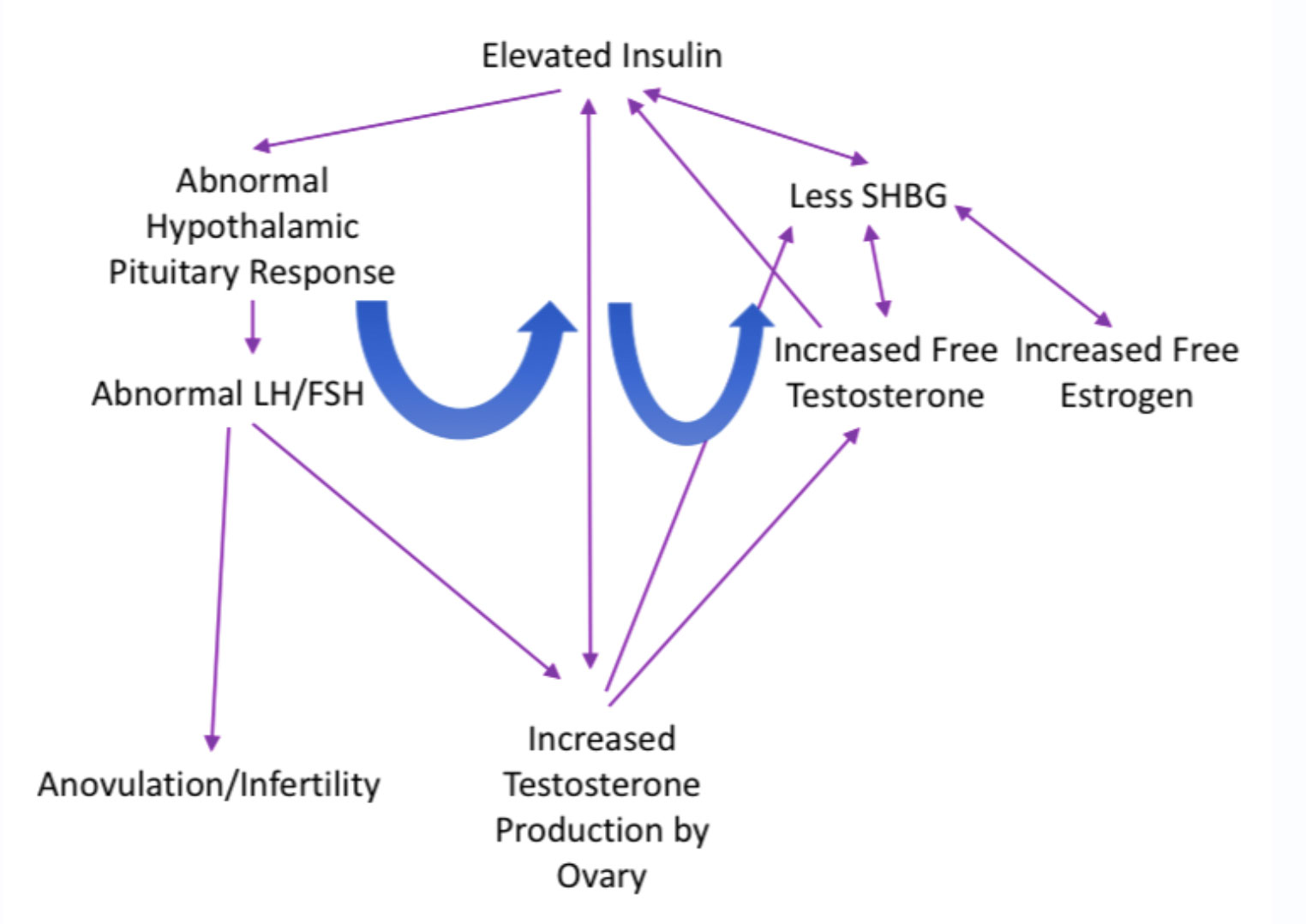
Fortifying Your Immune Health
Having lived through a once-in-a-lifetime pandemic, most of us are familiar with the basics of self-care to avoid getting sick. Despite this, the truth is that coronavirus
Polycystic ovary syndrome (PCOS) is a disorder characterized by hyperandrogenism, ovulatory dysfunction, and polycystic ovaries. Its etiology remains unknown.
PCOS is one of the leading causes of infertility and involves insulin resistance and glucose intolerance. Women with PCOS have a higher risk of Type 2 Diabetes, nonalcoholic fatty liver disease, metabolic syndrome, hypertension.
The underlying pathophysiology of PCOS is elevated insulin which leads to altered function of the hypotahalamus affecting FSH and LH secretion. The rise of LH causes more androgen hormones to be secreted. This causes an excess amount of estrogen in comparison to progesterone.
Elevated insulin leads to decreased SHBG (Sex hormone-binding globulin). This can lead to increase in free testosterone. An increase in testosterone can then further decrease SHBG. The elevated insulin can alter enzymes in the ovary to produce more androgens.
This is a Diagram by Joel Evans, MD who explains the sequence of events due to elevated insulin:

Insulin insensitivity is the major underlying cause which has a amplitude affect on other hormonal sequences of the body. Women with PCOS have a 43-46% prevalence of metabolic syndrome. Some studies have shown that 35% of obese women with PCOS have impaired glucose intolerance.
How to Manage PCOS?
Having a balanced diet rich in whole foods with lots of anti-inflammatory properties and limited processed foods will help with hormonal balance but it is also vital to balance your lifestyle too. Adaptogenic herbs and foods have been shown to reduce cortisol levels such as holy basil, liquorice root, turmeric, rosemary, aloe vera, mushrooms, withiana etc.
If you have any more queries about PCOS and managing some of the symptoms associated with this through diet, please contact a Health Professional or Qualified Nutritionist like myself.
References:
Frtiz,M.A.,&Speroff,L.(2010).ClinicalGynecologicEndocrinologyandInfertility Clinical Gynecologic Endocrinology and Infertility (8th ed.). Lippincott Williams & WilkinsKousta, E., Tolis, G., & Franks, S. (2005). Polycystic ovary syndrome. Revised diagnostic criteria and long-term health consequences. Hormones,4(3), 133-147. doi:10.14310/horm.2002.11151Corbould A. Effects of androgens on insulin action in women: is androgen excess a component of female metabolic syndrome? Diabetes Metab Res Rev 2008; 24: 520–532.Meyer ML, Malek AM, Wild RA, Korytkowski MT, Talbott EO. Carotid artery intima-media thickness in polycystic ovary syndrome: a systematic review and meta-analysis. Human Reproduction Update. 2012;18(2):112-126. doi:10.1093/humupd/dmr046.Pundir J, Psaroudakis D, Savnur P, Bhide P, Sabatini L, Teede H, Coomarasamy A, Thangaratinam S.Inositol treatment of anovulation in women with polycystic ovary syndrome: a meta-analysis of randomised trials. British Journal of Obstetrics and Gynaecology 2017.Evans, Joel. The Science behind PCOS. Metagenics seminar 2018.

Having lived through a once-in-a-lifetime pandemic, most of us are familiar with the basics of self-care to avoid getting sick. Despite this, the truth is that coronavirus

Polycystic ovarian syndrome (PCOS) is the most common hormonal disorder in females of reproductive age. This prevalent syndrome is a diverse disorder with different underlying biological mechanisms and is
Do you have any questions?
Please, get in touch.
P: 021 083 05423
E: info@keynutrition.co.nz
Do you have any questions?
Please, get in touch.
P: 021 083 05423
E: info@keynutrition.co.nz
Do you have any questions?
Please, get in touch.
P: 021 083 05423
E: info@keynutrition.co.nz
Do you have any questions?
Please, get in touch.
P: 021 083 05423
E: info@keynutrition.co.nz
Do you have any questions?
Please, get in touch.
P: 021 083 05423
E: info@keynutrition.co.nz